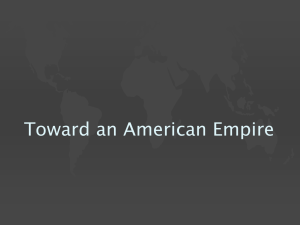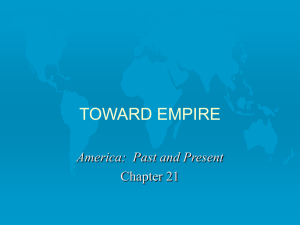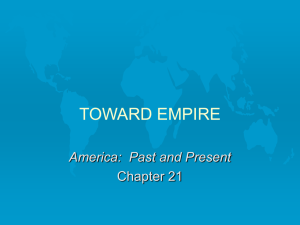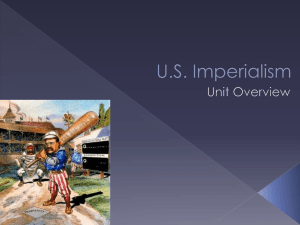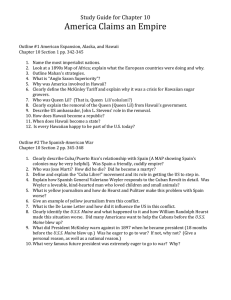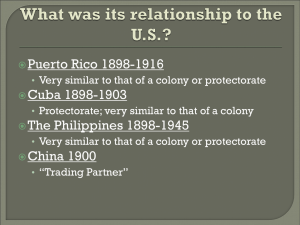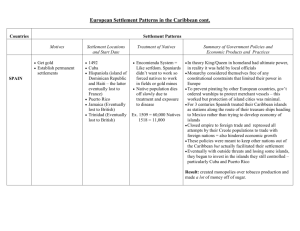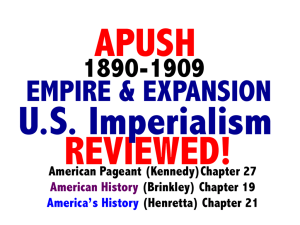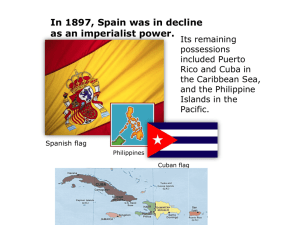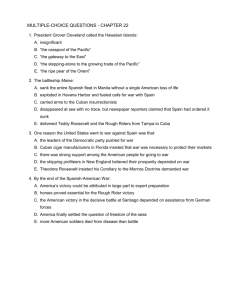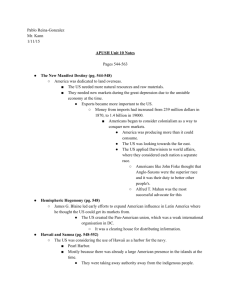Chapter 20: Imperialism
advertisement
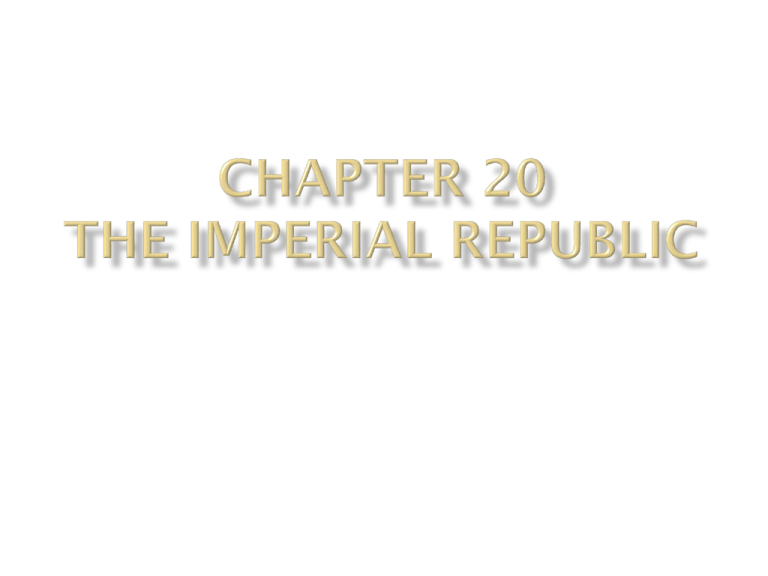
• American attention shifted to foreign lands – “closing of the frontier” • 1890s led some to fear natural resources would dwindle and must be found abroad, – Growing importance of foreign trade • 300% growth in this area between 1870-1900 – Depression of 1893 • desire for new markets, diversify economy – Fears • Europe imperialism would lead America to be left out of spoils • “Feeble” China and Asia looked tempting • Social Darwinism– • only fittest nations survive, therefore just for strong nations to dominate weaker ones Josiah Strong’s – Our Country: Its Possible Future and Its Present Crisis (1885) • states Anglo-Saxon “race” represented liberty, Christianity and should spread them; • John Burgess, political science professor duty of A-S to uplift less fortunate – Spread “superior institutions” – “Barbarism” is not a right – • Famous Admiral Alfred Thayer Mahan – wrote in The Influence of Sea Power Upon History (1890) • that countries w/ sea power were great nations of • • • • • • • historyUS needed to have foreign commerce merchant marine, Build Panama canal navy to defend routes and possessions colonies to provide raw materials and bases claim Pacific Islands, HI 1900- US 3rd in Naval Power • Sec of State James Blaine 1880s – sought to expand US influence in Latin America • to provide markets for surplus goods- – 1889 organized Pan-American Congress. • Created Pan-American Union – Weak: Information Clearing House • Rejected: Proposals for – Inter-American Customs union – Arbitration Procedures for disputes – Pres Cleveland 1895 had dispute w/ GB over Venezuela border • US Declared violation of Monroe Doctrine • Talk of war pushed GB to arbitration • Hawaii appealing b/c Navy wanted Pearl Harbor as base, – Americans who had settled on island had come to dominate political + economic life of islands – Hawaii had been series of islands w/ self-sufficient communities. – After 1810 American traders, missionaries, planters began settling there. – Disease decimated Native populations; – by 1840s Americans spread thru islands – 1887 US Navy negotiated to use Pearl Harbor as Navy base; sugar exports to US basis of economy, American plantation system displacing natives from their lands New Asian immigrants “more reliable and docile” Queen Liliuokalani 1891. Nationalist Challenged US control Only in power 2 years American and European interests organized overthrow and annexation to the US. Causes: 1895-Cuban struggle against Spain Concentration camps and “atrocities” General Valeriano “Butcher” Weyler (US press) Wilson-Gormon Tariff Hurt Cuban economy (sugar cane). Yellow Journalism Hearst and Pulitzer- New form of “sensational” journalism fueled by intense competition. Searched for “atrocities” to report on. Cuban-American support influenced public Example 1: New York Tribune Example 2: The New York Journal Dupuy de Lome Letter- Called Mckinley “weak” and pandering to the US public Outraged Americans The Maine: Battleship blew up in Havana harbor. Thought to be a Spanish Mine Actually an internal explosion Press: “Remember the Maine!!” US public opinion in favor of war Many in Mckinley’s admin pushed for war: Roosevelt Public support in favor of war 4-5 month war 450 battlefield casualties 5,200 to disease and sickness Northern black soldiers: Outraged by treatment in the South: led to confrontations. Played important roles in battles Angered by equal treatment given to Black Cuban Rebels Commodore George Dewey First hero of the war Instructed to destroy Spanish navy in Manila if war broke out. No casualties Led to capture of the Philippines Inefficient and poorly planned Rough Riders Led by Roosevelt Gained fame in charge up Kettle Hill Some deemed charge “reckless” “the great day of my life” Spanish fleet destroyed at Santiago Ground forces soon surrendered Puerto Rico captured Armistice Cuban Independence declared Puerto Rico and Guam ceded to US Jones Act: Declared Puerto Rico a US territory Made Puerto Ricans US citizens American occupation of Manila To Annex or Not to Annex? Many Americans uncomfortable with idea due to distance from home. Treaty of Paris 1898 Ended the war Ceding of Puerto Rico, Guam, Cuba $20M payment for the Philippines Opposed annexation of the Philippines included powerful names: Carnegie Mark Twain Samuel Gompers Claimed imperialism was: Immoral Anti-American values: anti-freedom “pollution” of US population Industrial workers feared competition Conservatives feared Sugar growers Large standing army Entangling alliances Threat to freedoms Feared competition How will you deal with the “population”? Roosevelt: Reinvigorate and restore the nation Business Inroads to dominate Asian trade Profit in the Philippines Republicans Wanted political points for gaining new territories Easy to accomplish since US possessed the lands Citizenship need NOT be granted William Jennings Bryan Anti-imperialist Supported the Treaty of Paris to make it an election issue. Bryan Loses to McKinley Colonial issue Economic prosperity Personality and hero status of VP Roosevelt Alaska, Hawaii, Puerto Rico: Few problems Cuba US occupation till 1902 to prepare for “independence”. Infrastructure investment US planned to dominate economic and political landscape Platt Amendment: No foreign treaties US right to intervene in Cuba for independence, life, property Naval bases Dominated by US business Plantations Factories Railroads Refineries Capital Resources: much owned by US Prompted small revolts against US Imperialism Multiple military interventions Rebels fought the US for independence Relatively long: 1898 to 1902 4,300 US casualties 50,000 Native casualties Tactics Guerrilla warfare: New to Americans Caused US to be more brutal and similar to Spanish in Cuba: Weylar Emilio Aguinaldo Experienced in fighting Spanish Claimed to be legitimate govt. of Philippines General Arthur MacArthur (father of Douglass MacArthur) Resorted to more brutal tactics as resistance became stronger (with popular support). Prisoners executed Village evacuations Concentration camps “Shoot everyone over the age of 10” Death Ratio 15 killed: 1 wounded 1 killed: 5 wounded (US Civil War) Eventual capture of Aguinaldo and defeat of rebels Large US infrastructure investment Schools Hospitals Roads Sewers US and Islands became economically linked Philippine independence comes in 1946 US desire to expand Asian markets and trade Weak China: Who wants some pie? Japan Britain Germany Russia France US All competing for piece of China Sec. of State John Hay Asked competing countries to obey 3 principles: Respect the rights and privileges of other nations (EXCEPT CHINA!!!) Chinese officials to continue collection of tariffs. Favored the US Non-discrimination against other nations in relation to transportation rates. Advantages Allow US to continue in China w/o fear of war Retain “illusion” of Chinese sovereignty Prevent formal dismemberment of China (hurt US) Cool reception from other nations Open declaration from US that all nations had agreed Boxer Rebellion Chinese rebellion against foreign influence Diplomats trapped in China US sends navy to rescue diplomats Film: The Sand Pebbles 1966 US helps broker end to conflict and retains Open Door policy Weaknesses of US military became obvious in war with Spain Elihu Root: appointed Sec of War by McKinley Enlarged Army: 25K to 100K National Guard: insures stock of trained soldiers Officer training schools Creation of Joint Chiefs (military advisors) Supervise and coordinate the military

